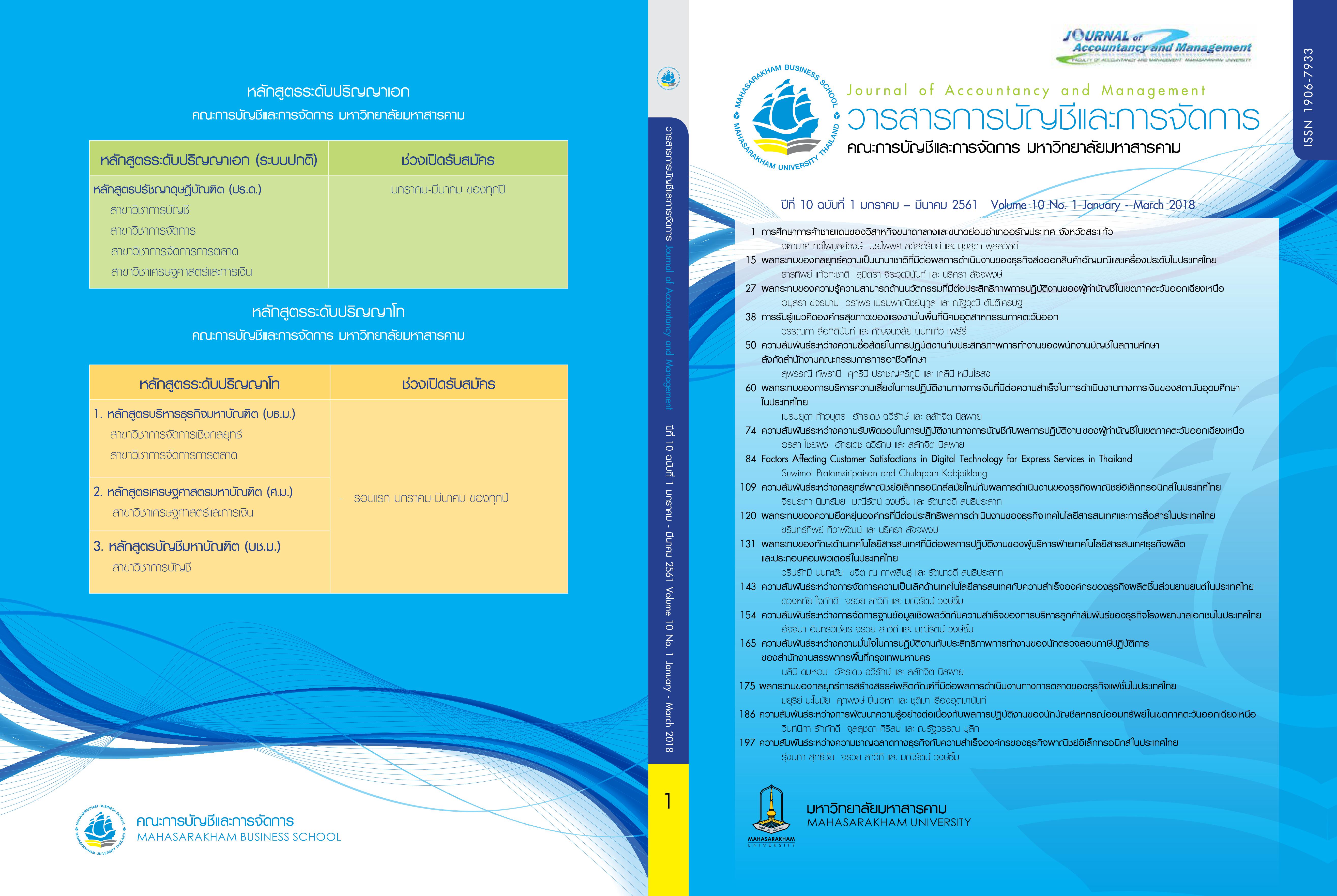ความสัมพันธ์ระหว่างความชาญฉลาดทางธุรกิจ กับความสำเร็จองค์กรของธุรกิจพาณิชย์อิเล็กทรอนิกส์ในประเทศไทย
Main Article Content
บทคัดย่อ
การวิจัยครั้งนี้มีวัตถุประสงค์เพื่อทดสอบความสัมพันธ์ระหว่างความชาญฉลาดทางธุรกิจกับความสำเร็จองค์กรของธุรกิจพาณิชย์อิเล็กทรอนิกส์ในประเทศไทย โดยใช้แบบสอบถามเป็นเครื่องมือในการเก็บรวบรวมข้อมูล จากผู้บริหารธุรกิจพาณิชย์อิเล็กทรอนิกส์ในประเทศไทย จำนวน 134 คน สถิติที่ใช้ในการวิเคราะห์ข้อมูล ได้แก่ การวิเคราะห์สหสัมพันธ์แบบพหุคูณ การวิเคราะห์การถดถอยอย่างง่าย และการวิเคราะห์การถดถอยแบบพหุคูณ ผลการวิจัย พบว่า ความชาญฉลาดทางธุรกิจ ได้แก่ ด้านเหมืองข้อมูล และด้านตลาดข้อมูล มีความสัมพันธ์ และผลกระทบเชิงบวกกับความสำเร็จองค์กร ดังนั้น ผู้บริหารธุรกิจควรให้ความสำคัญกับความชาญฉลาดทางธุรกิจ ด้านเหมืองข้อมูล และด้านตลาดข้อมูลเพื่อเพิ่มศักยภาพในการแข่งขันของธุรกิจให้มากที่สุด
Downloads
Article Details
บทความที่ได้รับการตีพิมพ์เป็นลิขสิทธิ์ของวารสารการบัญชีและการจัดการ
ข้อความที่ปรากฏในบทความแต่ละเรื่องในวารสารวิชาการเล่มนี้เป็นความคิดเห็นส่วนตัวของผู้เขียนแต่ละท่านไม่เกี่ยวข้องกับมหาวิทยาลัยมหาสารคาม และคณาจารย์ท่านอื่นๆในมหาวิทยาลัยฯ แต่อย่างใด ความรับผิดชอบองค์ประกอบทั้งหมดของบทความแต่ละเรื่องเป็นของผู้เขียนแต่ละท่าน หากมีความผิดพลาดใดๆ ผู้เขียนแต่ละท่านจะรับผิดชอบบทความของตนเองแต่ผู้เดียว
เอกสารอ้างอิง
กรมพัฒนาธุรกิจการค้า. (2558). การจดทะเบียนธุรกิจเดือนมิถุนายน 2558 และครึ่งปีแรก. ค้นเมื่อ 14 กรกฎาคม 2558, จาก http://www.dbd.go.th/ewt_news.php?nid=12361
คเชนทร์ อึ่งสกุล. (2552). การพัฒนาระบบคลังข้อมูลด้านแรงงานของสำนักงานสถิติจังหวัดเชียงใหม่.วิทยานิพนธ์ วท.ม. เชียงใหม่ : สาขาวิชาวิทยาการคอมพิวเตอร์ คณะวิทยาศาสตร์ มหาวิทยาลัยเชียงใหม่.
ธเนศ วัฒนคุณากร. (2546). สร้างอนาคตให้กับองค์กรด้วย Business Intelligence. ค้นเมื่อ 14 กันยายน 2558, จาก http://intranet.dip.go.th/article/datafile/e-leader08.pdf
ธุรกิจอุตสาหกรรมไทย. (2549). ธุรกิจพาณิชย์อิเล็กทรอนิกส์. ค้นเมื่อ 30 เมษายน 2558, จากhttp://www.thailandindustry.com
บุญชม ศรีสะอาด. (2554). การวิจัยเบื้องต้น (พิมพ์ครั้งที่ 9). ฉบับปรับปรุงใหม่. กรุงเทพฯ : สุวีริยาสาส์น.
ปภาดา โพธิ์คำอภิชัย และ มณเฑียร รัตนศิริวงศ์วุฒิไทย. (2557). การพัฒนาระบบธุรกิจอัจฉริยะเพื่อการวางแผนการผลิตในองค์กร. ภาควิชาการจัดการเทคโนโลยีสารสนเทศ คณะเทคโนโลยีสารสนเทศ มหาวิทยาลัยเทคโนโลยีพระจอมเกล้าพระนครเหนือ.
ปราลี โพนคำ. (2553). Business Intelligence and Business Dashboard. ค้นเมื่อ 2 สิงหาคม 2558, จาก http://www.spu.ac.th/announcement/articles/business_intell.pdf
ปาริชาติ สุขศิลป์. (2551). ระบบคลังข้อมูลขนาดเล็กสำหรับผู้จัดการฝ่ายการตลาด : กรณีศึกษาโรงพยาบาลกรุงเทพ. วิทยานิพนธ์ วท.ม. นครศรีธรรมราช : สาขาวิชาการจัดการเทคโนโลยีสารสนเทศ มหาวิทยาลัยวลัยลักษณ์.
เพ็ญศิริ มโนมัยสุพัฒน์. (2557). ธุรกิจอัจฉริยะกับความท้าทายในการพัฒนาเพื่อใช้ในองค์กร. วารสารปัญญาภิวัฒน์ 5(2) : 236-245
สำนักงานส่งเสริมการค้าระหว่างประเทศ. (2557). ตลาดพาณิชย์อิเล็กทรอนิกส์ (E-Commerce). ค้นเมื่อ 3 ตุลาคม 2558, จาก http://www.ditp.go.th/main.php?filename=intro
สุรฉัตร ยงใจยุทธ. (2554). ความสัมพันธ์ระหว่างความเป็นอัจฉริยะทางธุรกิจที่มีต่อความสำเร็จในการดำเนินงานของธุรกิจพาณิชย์อิเล็กทรอนิกส์ในประเทศไทย. บธ.ม. มหาวิทยาลัยมหาสารคาม. สาขาวิชาการจัดการเทคโนโลยีและพาณิชย์อิเล็กทรอนิกส์. คณะการบัญชีและการจัดการ มหาวิทยาลัยมหาสารคาม.
Aaker, D. A., Kumer, V. & Day, G. S. (2005). Marketing research. New York : John Wiley & Sons.
Black, K. (2006). Business statistics for contemporary decision making. New York : John Wiley & Sons.
Nunnally, J. C., & Bernstein, I. H. (1978). Psychometric theory (2nd ed.). New York : McGraw-Hill.
Schiemann, W. A., & Lingle, J. H. (2001). Balanced scorecard to strategy gauges : Is measurement worth It management review. New York : Prince.


